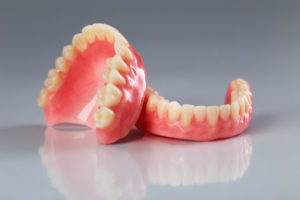
At Value Smiles, we provide dentures for uninsured patients for as little as $599-999. Contact us today at 678-607-9723 to set up an appointment!
What are Dentures?
As you probably know, dentures are replacement teeth for patients who have lost their natural teeth. Dentures are made from a combination of soft and hard plastic (acrylic) and fit into the mouth by the power of suction and denture adhesives. Dentures must be removed and soaked at night when you sleep, to avoid drying out when saliva production decreases during the night.
Today’s dentures are more natural-looking and comfortable than dentures of the past, and can give you a beautiful smile to replace your lost teeth. They tend to stay in place better, as well; dentures today can be made to fit the precise dimensions of your mouth using high-tech imaging and constructive technology.
One of the drawbacks of conventional dentures is the fact that they exert pressure on the gum tissue when biting and chewing food. For many patients, this means taking care to avoid foods that are too hard or chewy, as this can irritate the gums. If the dentures do not fit well, this can also lead to lesions and soreness on the gum tissue. This is why it’s very important to see your dentist every six months (even though your natural teeth may be gone), to make sure your dentures fit properly and that your gum tissue stays healthy. Over time, dentures need to be relined because the dimensions of the mouth change as jawbone tissue deteriorates.
Partial vs. Full Dentures
Most people do not lose their teeth all at once, and some teeth stay healthy and strong throughout your life. When a patient has lost a number of teeth, but still has enough healthy teeth to support a prosthetic, partial dentures may be recommended. Partials may be made for the top or bottom arch, and are usually composed of a cast metal (wire) or flexible acrylic frame and the attached prosthetic teeth. Partials often resemble a retainer, like those worn after braces, and snap in and out of place around the natural teeth.
If you have lost a number of teeth, your dentist may recommend either full or partial dentures, depending on the condition of your teeth and gums. If gum disease has damaged your soft tissues or destabilized your remaining teeth, it may be more effective to have teeth extracted so full dentures can be made.
Caring for Dentures
Dentures require a number of changes to your oral care regimen, but most are easy to get used to. Some of the biggest of these changes include the following:
- Remove and rinse dentures after you eat.
- Brush, sanitize, and soak dentures each night.
- Do not use standard toothbrushes or toothpaste on dentures—these are too abrasive and can scratch or damage the plastic.
- Do not expose dentures to high heat, which can warp the plastic.
- Gently brush your gums twice a day to remove plaque and bacteria and prevent painful sores from developing.
- Treat the dentures with gentle care; they are strong when used properly, but can shatter if dropped on the floor or into a sink.
With proper care, dentures usually last about five to eight years before needing replacement. Many patients can wear their dentures for as long as ten years with proper oral hygiene and regular dental check-ups.
Alternatives to Traditional Dentures
For hundreds of years, removable dentures have been the standard form of tooth replacement for most people–but recent decades have seen the advent of dental implant-based dentures. With this treatment, small titanium implants are surgically inserted into the gum tissue, where they then fuse with the jawbone and serve as a base for single and multi-tooth prosthetics. Implant-supported dentures are more comfortable, since they do not apply pressure to the gum tissue. They are also more stable, since they attach securely to the bones of the jaw. However, implant dentures require a much longer timeline and come at greater financial cost.
If you would like to learn more about implant-supported dentures, ask one of our Value Smiles doctors to explain the differences between the two types of dentures.
To learn more about dentures, contact Value Smiles, your Lithia Springs, GA dental practice. Our qualified dentists are committed to making high quality dentistry affordable for all patients, and can help you get the services and care you deserve. Call us at 678-607-9723 to learn more about affordable dentistry and dentures.


